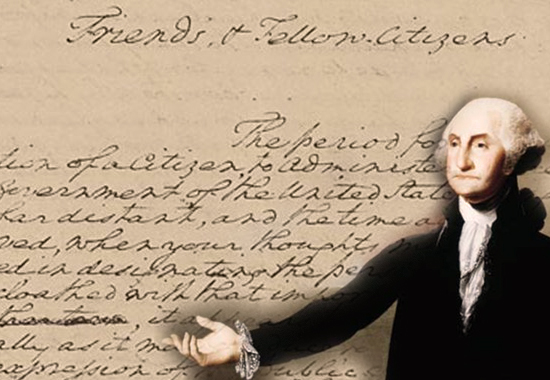 In this Proclamation, Washington addressed the war that was occurring between Austria, Prussia, Sardinia, Great Britain and the United Netherlands versus France. He stated that all citizens of the U.S. should avoid all actions that may contravene such disposition in any way, and that if they do commit such actions, they will not receive the protection of the United States. Anyone to commit those actions would also be prosecuted as a betrayer under the law of United States government.
In this Proclamation, Washington addressed the war that was occurring between Austria, Prussia, Sardinia, Great Britain and the United Netherlands versus France. He stated that all citizens of the U.S. should avoid all actions that may contravene such disposition in any way, and that if they do commit such actions, they will not receive the protection of the United States. Anyone to commit those actions would also be prosecuted as a betrayer under the law of United States government.Washington's Farewell Address 1796
Washington wrote this address to inform the citizens of the fact that he would not wish to be re-elected for a third term as president, and why he had chosen not to do so. He informed the people that he didn't choose this path out of lack of respect for them, but because he wished to go into retirement. After his first term in office, he was reluctant to run again for the presidency. He had wanted to go into retirement then, instead of now. The reason he didn't go into retirement after his first term, was because he wanted to ensure the nation was in good standings before he left office, and in the state that the country was in, he couldn't stand to abandon his country. Washington also felt that could now retire because he had highly contributed to the organization and administration of the government, and the country was now stable enough to have a new president elected, and still be very successful with what he has laid out for the next leader. He also believed that the country was very strong and secure because each part of the country could depend on one another for trading and success. He also made it clear that he believed in the unity of the states as a whole, and expressed the need for the country to stay united, no matter what may happen. He also believed that if the states stuck with what they believed in, and maintained their good morals, they wouldn't fail. He also portrayed his belief in the quality of the Constitution, and how important he believed it was to follow it. He warned of people who did not beleive in the Constitution, because those people could ruin the country's unity, and become the cause of riots and unrest throughout the states. In the last few lines of his address, he made sure to acknowledge the importance of the country remaining neutral, concluding with his belief in the good laws that had been set under a free government.

No comments:
Post a Comment